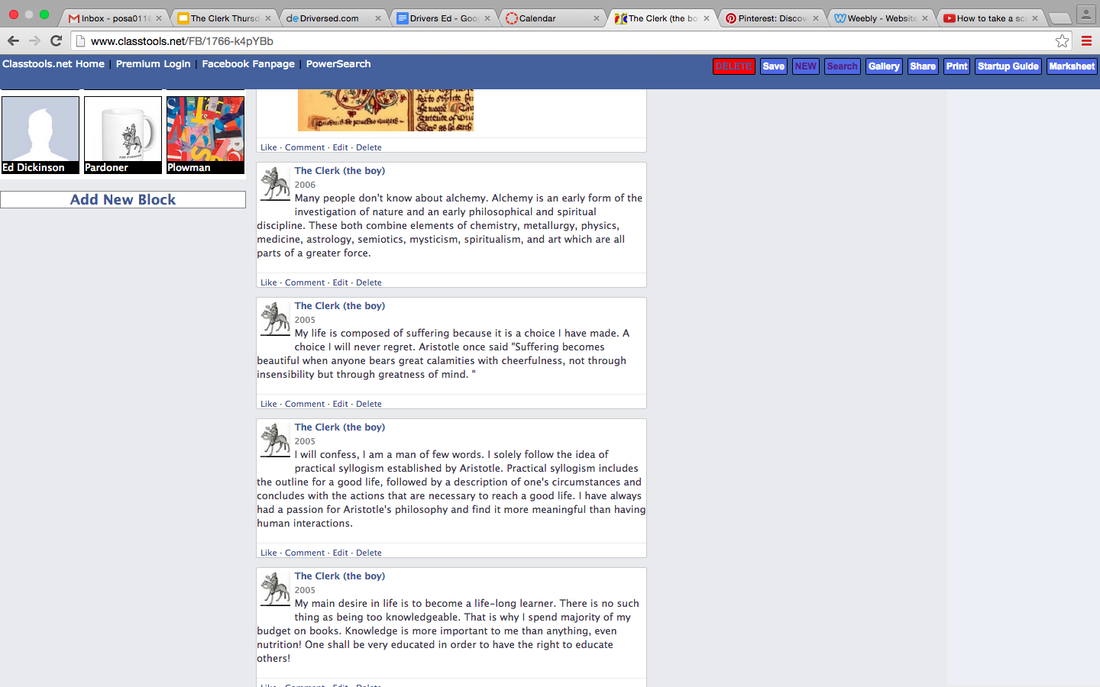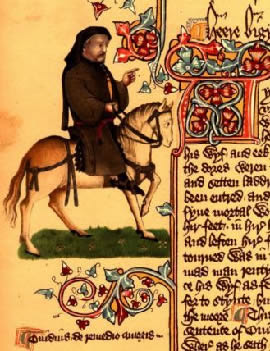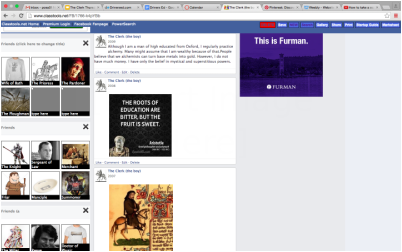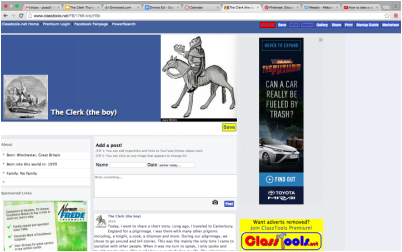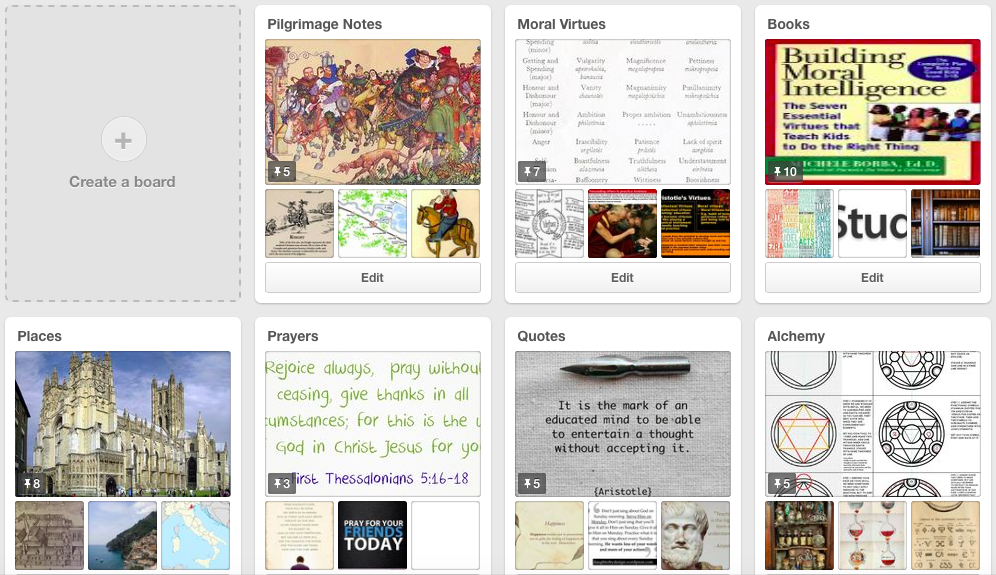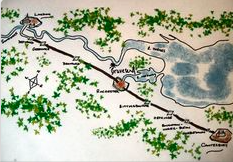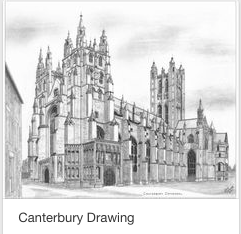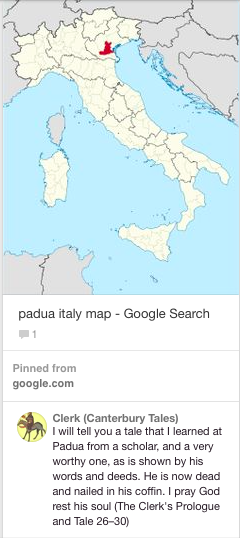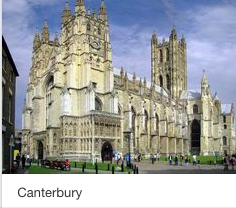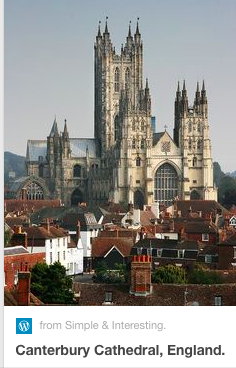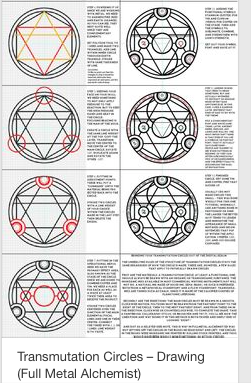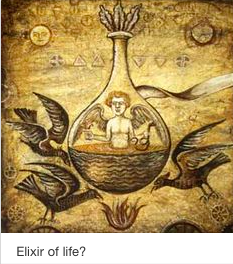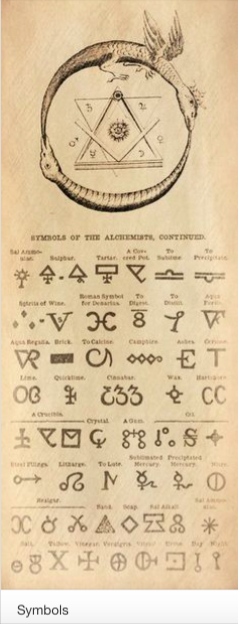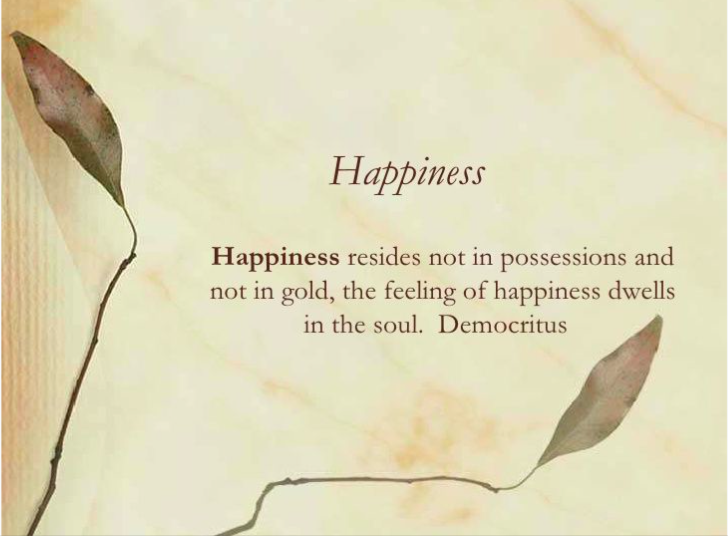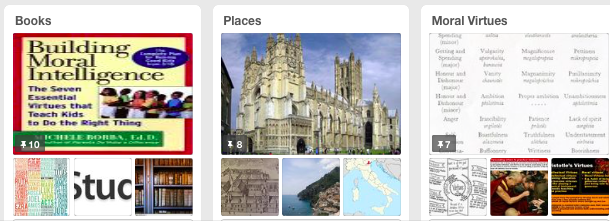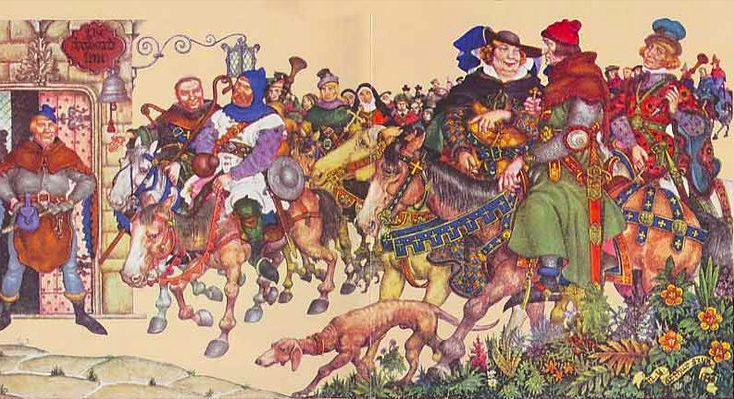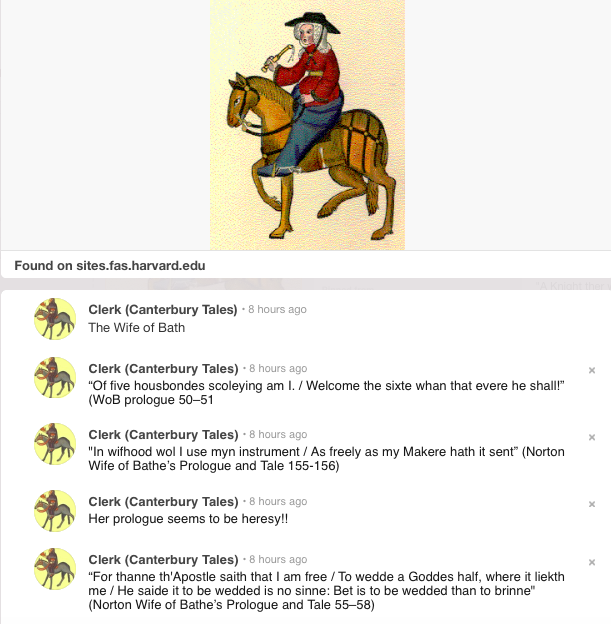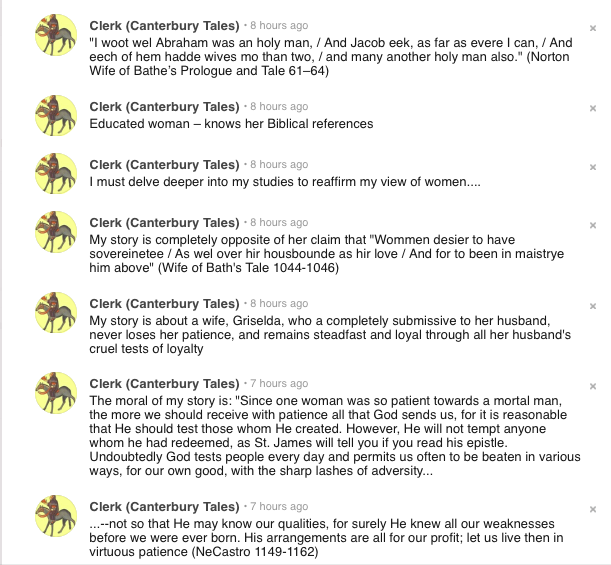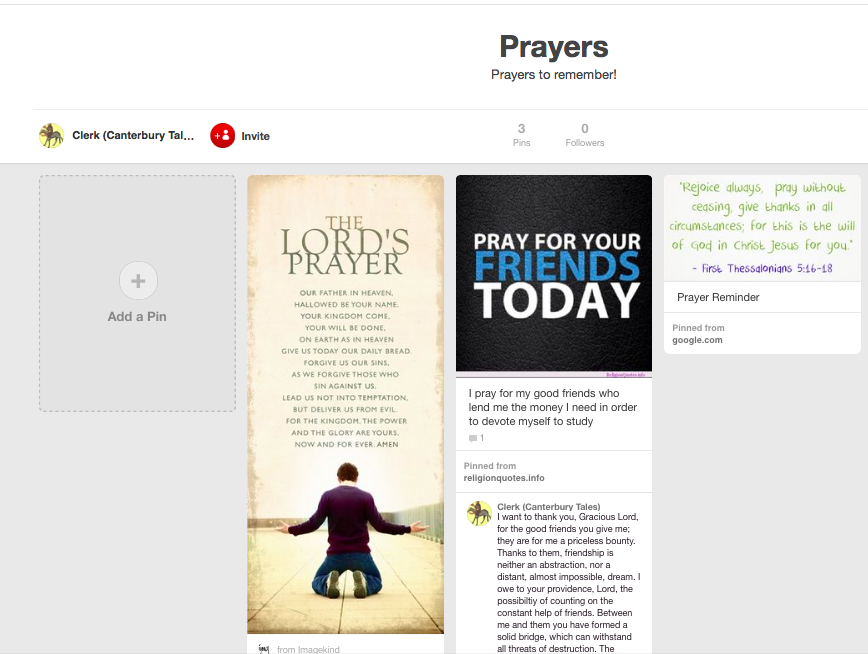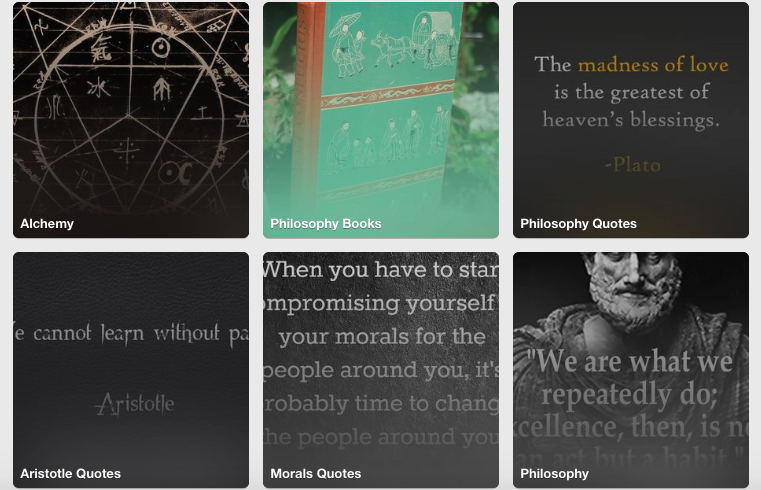The Clerk
Autobiography– About the Clerk
|
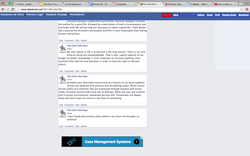
Why a Fakebook?
We chose a Fakebook as the Digital autobiography for the Clerk because he was a highly educated men who loved to discuss his ideas and beliefs. The Clerk was one who didn't speak much so we suppose that he wouldn't have difficulty writing about moral virtue and his personal life. Fakebook is a quick way to spread announcements and has many different types of groups to join. The Clerk would of perhaps used Fakebook as a way of finding other people with similar lifestyles as his. Lastly, with all the posts that can be made on a Fakebook, the Clerk could spend some of his reading time in a media like this to communicate with other philosophers and alchemists.
We chose a Fakebook as the Digital autobiography for the Clerk because he was a highly educated men who loved to discuss his ideas and beliefs. The Clerk was one who didn't speak much so we suppose that he wouldn't have difficulty writing about moral virtue and his personal life. Fakebook is a quick way to spread announcements and has many different types of groups to join. The Clerk would of perhaps used Fakebook as a way of finding other people with similar lifestyles as his. Lastly, with all the posts that can be made on a Fakebook, the Clerk could spend some of his reading time in a media like this to communicate with other philosophers and alchemists.
The Commonplace Book
Why Pinterest?We choose Pinterest as the medium for the Clerk's commonplace book because it is easy to use and keeps everything organized. The Clerk would not want to spend much time learning how to use Pinterest, so the ease of use would be appealing (just a few clicks needed to "pin" a post!). The Clerk would appreciate ease of use because he would not want Pinterest to detract from his reading time.The organization is important because, again, the Clerk would not want to loose reading time.
Our group decided on a Pinterest because the board would allow the Clerk, who we saw as antisocial, to post and own social media in the most antisocial way. The board allows him to post without talking directly to others and allows him to express feelings rather than post pictures of his social life. |
Boards |
A Little About the Clerk's Pinterest Boards
Places |
Pilgrimage Notes |
|
This page includes images of the Canterbury Cathedral, two pictures and a drawing, to show the Clerk’s destination and the possible influence of religion on his values. This page also includes a simple map to Canterbury, representing the Clerk’s education and desire to be logical and plan ahead.
A major location for the Clerk is Padua, Italy, where it is said he traveled and met Francis Petrarch. This would have been a major event in the Clerk’s life, so it is included in his commonplace book as both a picture and a location on a map. |
This board contains the Clerk's personal notes regarding the pilgrimage to Canterbury. His notes include a picture of all the pilgrims on the journey. However, the picture of the pilgrims does not seem to depict the Clerk as a major figure, which shows that the Clerk falls through the cracks in large group settings because he is not noticeable in the image.
The Clerk also makes note of his reactions to the Wife of Bath's tale in a post, making sure to record quotes he finds relevant. The Clerk ‘s Wife of Bath post also exemplifies his willingness to rethink opinions and conduct research in his books. |
AlchemyThe last section of the Pinterest page relates to the Clerk’s involvement with alchemy. This page shows the Clerk’s fantastical side and includes images such as the Elixir of Life and transmutation circles. These practices of alchemy are important to the Clerk, which is ironic due to the fact that he is well educated and founded in the logical world.
QuotesThe Clerk includes a page of inspirational and thought provoking quotes. He includes quotes from famous philosophers and well-educated people, such as Aristotle. He also includes quotes without a name, less well known but just as moving. These quotes range from topics such as happiness to topics like education. They also help to represent the Clerk’s love for knowledge as well as the thought provoking and influential ideas that come from his reading.
One Last Thing To Note…The boards that include the most pins are: Books, Moral Virtue, and Places. These three boards reflect the Clerk's highest values: books and knowledge, moral virtue, and traveling to preach moral virtue.
|
PrayersThis section reflects that the Clerk is still a religious man even though he did not go into the Church. The Clerk is not an official part of the Church, but was educated as a cleric who would go into the Church, so religion and prayers influence his thinking. The Lord’s Prayer was chosen because the Clerk might pray, but he only knows the common prayers, and he is not as exposed to prayers used in other situations.
Who Does the Clerk Follow?The Clerk is an antisocial person, and does not wish to follow any specific people or their boards. The Clerk only follows 6 "topics" (5 of these topics were required as you cannot create an account without following at least 5 Topics). Notice that 4 of these topics are philosophy topics, which reflects the Clerk's intense devotion to the study of philosophy.
|
The Full Paper
The Clerk is a pilgrim in the story the Canterbury Tales. This text is a tale of pilgrims on a journey to Canterbury. The Clerk is an educated man who went to Oxford and followed the path of a cleric, but rather than going into the service of the church, he left and went into the world on his own. He is well educated but very poor due to his excessive expenses for the purchasing of books. He uses just enough money to survive and then spends the rest on books, even resorting to borrowing money to buy more books. Because of his elaborate spending on books, the Clerk is very thin, and he and his horse are both described as emaciated. The irony of the Clerk is his practice of alchemy. He is a well-educated man who should be founded in the logical world, yet he still practices alchemy, which is not based on science. Alchemy involves trying to perform acts such as turning lead into gold, which is not possible through science.
For our representation of the Clerk we have chosen to use a Pinterest as a modern commonplace book and a Fakebook as a autobiography that the Clerk would make.
The Clerk’s Pinterest board is taking the place of a modern day commonplace book. Our group decided on a Pinterest because the board would allow the Clerk, who we saw as antisocial, to post and own social media in the most antisocial way. The board allows him to post without talking directly to others and allows him to express feelings rather than post pictures of his social life.
The first section of the board consists the Clerk’s notes about the places on his pilgrimage. It shows a simple map to Canterbury, representing the Clerk’s education and desire to be logical and plan ahead. The section also includes a picture of Oxford, which refelcts the Clerk’s education and upcoming as well as representing his love for knowledge. This page also includes images of the Canterbury cathedral, two pictures and a drawing, to show the Clerk’s destination and the possible influence of religion on his values. A major location for the Clerk is Padua, Italy, where it is said he traveled and met Francis Petrarch. This would have been a major event in the Clerk’s life, so it is included in his commonplace book as both a picture and a location on a map.
The next section of the Pinterest page is a set of prayers. This shows that the Clerk is still a slightly religious man even though he did not go into the church. The Clerk is not an official part of the church, but was educated as a cleric who would go into the church, so religion and prayers influence his thinking. The Lord’s Prayer was chosen because the Clerk might pray but he only knows the common prayers, and he is not as exposed to prayers used in other situations.
The Clerk includes a page of inspirational and thought provoking quotes. He includes quotes from famous philosophers and well-educated people, such as Aristotle. He also includes quotes without a name, less well known but just as moving. These quotes range from topics such as happiness to topics like education. These quotes help to represent the Clerk’s love for knowledge as well as the thought provoking and influential ideas that come from his reading.
The Clerk also has a page titled Pilgrimage Notes, which includes two maps to Canterbury showing his logical side and step-by-step process to reach Canterbury. There is also a picture of all the pilgrims on the journey, which shows that the Clerk falls through the cracks in large group settings because he is not noticeable in the image. The Clerk ‘s Wife of Bath post exemplifies his willingness to rethink opinions and conduct research in his books.
A fairly self-explaining section of the commonplace book is the section about books. It shows many of the classic books of the time as well as Francis Petrarch, a famous poet that the Clerk may have met. This section also includes an article on the, “100 Must Read Books for Men,” showing that the Clerk is still rooted in stereotypes of the time. Another section on the Pinterest is about moral values. It shows how the Cerk is looking for perfection, which may tie into his alchemy in which he wishes to turn an imperfect metal into gold, a perfect metal. In the Moral Values of the commonplace book the Clerk has included many images of the values he wishes to live by such as faith, charity, and justice.
The last section of the Pinterest page relates to the Clerk’s involvement with alchemy. This page shows the Clerk’s fantastical side and includes images such as the elixir of life and transmutation circles. These practices of alchemy are important to the Clerk, which is ironic due to the fact that he is well educated and founded on the logical world.
The Pinterest page is only the Clerk’s commonplace book, a place for him to store information and notes he feels are relevant to him. To create a digital autobiography of the Clerk, our group decided to use a Fakebook. We decided on the Fakebook because the Clerk seems like an antisocial person and with a Facebook, he can post without talking to people and can spend time looking at other people’s posts that interest him. The Fakebook page starts with the basics such as when and where he was born. It also displays his friends, which are mostly other pilgrims that accompany the clerk on the pilgrimage. A major theme throughout this Fakebook is education, especially education stemming from Aristotle. At one point the Clerk quotes Aristotle and says that moral virtues are a branch of our good qualities. This not only shows both the Clerk’s love for education through the use of Aristotle, but also his desire to spread moral virtue. Moral virtue is another major theme for the Clerk because it something that he believes in very strongly, second only to education. On this page the Clerk also mentions that he spends all his money on books because he values education over nutrition. He believes that education more than anything else because, as he quotes on his page, the roots of education are bitter, but the fruits are sweet. He also shows his belief in education by saying that a person must first become educated before they have the right to teach others. The last theme on the Clerk’s Fakebook page is alchemy. Alchemy is the irony of the Clerk and so it was important to us to include it in his autobiography. He includes a brief description of his journey to show that it was a major event in his life.
So once again, the Clerk is a pilgrim in the Canterbury Tales on a journey to Canterbury. He is very educated yet practices alchemy. The Clerk is antisocial and carries many books with him on his journey to take the place of human interaction. We choose a Pinterest and a Fakebook to represent him because in these methods of social media he can be antisocial and still preach moral virtues, learn from others, and post about his alchemy.
For our representation of the Clerk we have chosen to use a Pinterest as a modern commonplace book and a Fakebook as a autobiography that the Clerk would make.
The Clerk’s Pinterest board is taking the place of a modern day commonplace book. Our group decided on a Pinterest because the board would allow the Clerk, who we saw as antisocial, to post and own social media in the most antisocial way. The board allows him to post without talking directly to others and allows him to express feelings rather than post pictures of his social life.
The first section of the board consists the Clerk’s notes about the places on his pilgrimage. It shows a simple map to Canterbury, representing the Clerk’s education and desire to be logical and plan ahead. The section also includes a picture of Oxford, which refelcts the Clerk’s education and upcoming as well as representing his love for knowledge. This page also includes images of the Canterbury cathedral, two pictures and a drawing, to show the Clerk’s destination and the possible influence of religion on his values. A major location for the Clerk is Padua, Italy, where it is said he traveled and met Francis Petrarch. This would have been a major event in the Clerk’s life, so it is included in his commonplace book as both a picture and a location on a map.
The next section of the Pinterest page is a set of prayers. This shows that the Clerk is still a slightly religious man even though he did not go into the church. The Clerk is not an official part of the church, but was educated as a cleric who would go into the church, so religion and prayers influence his thinking. The Lord’s Prayer was chosen because the Clerk might pray but he only knows the common prayers, and he is not as exposed to prayers used in other situations.
The Clerk includes a page of inspirational and thought provoking quotes. He includes quotes from famous philosophers and well-educated people, such as Aristotle. He also includes quotes without a name, less well known but just as moving. These quotes range from topics such as happiness to topics like education. These quotes help to represent the Clerk’s love for knowledge as well as the thought provoking and influential ideas that come from his reading.
The Clerk also has a page titled Pilgrimage Notes, which includes two maps to Canterbury showing his logical side and step-by-step process to reach Canterbury. There is also a picture of all the pilgrims on the journey, which shows that the Clerk falls through the cracks in large group settings because he is not noticeable in the image. The Clerk ‘s Wife of Bath post exemplifies his willingness to rethink opinions and conduct research in his books.
A fairly self-explaining section of the commonplace book is the section about books. It shows many of the classic books of the time as well as Francis Petrarch, a famous poet that the Clerk may have met. This section also includes an article on the, “100 Must Read Books for Men,” showing that the Clerk is still rooted in stereotypes of the time. Another section on the Pinterest is about moral values. It shows how the Cerk is looking for perfection, which may tie into his alchemy in which he wishes to turn an imperfect metal into gold, a perfect metal. In the Moral Values of the commonplace book the Clerk has included many images of the values he wishes to live by such as faith, charity, and justice.
The last section of the Pinterest page relates to the Clerk’s involvement with alchemy. This page shows the Clerk’s fantastical side and includes images such as the elixir of life and transmutation circles. These practices of alchemy are important to the Clerk, which is ironic due to the fact that he is well educated and founded on the logical world.
The Pinterest page is only the Clerk’s commonplace book, a place for him to store information and notes he feels are relevant to him. To create a digital autobiography of the Clerk, our group decided to use a Fakebook. We decided on the Fakebook because the Clerk seems like an antisocial person and with a Facebook, he can post without talking to people and can spend time looking at other people’s posts that interest him. The Fakebook page starts with the basics such as when and where he was born. It also displays his friends, which are mostly other pilgrims that accompany the clerk on the pilgrimage. A major theme throughout this Fakebook is education, especially education stemming from Aristotle. At one point the Clerk quotes Aristotle and says that moral virtues are a branch of our good qualities. This not only shows both the Clerk’s love for education through the use of Aristotle, but also his desire to spread moral virtue. Moral virtue is another major theme for the Clerk because it something that he believes in very strongly, second only to education. On this page the Clerk also mentions that he spends all his money on books because he values education over nutrition. He believes that education more than anything else because, as he quotes on his page, the roots of education are bitter, but the fruits are sweet. He also shows his belief in education by saying that a person must first become educated before they have the right to teach others. The last theme on the Clerk’s Fakebook page is alchemy. Alchemy is the irony of the Clerk and so it was important to us to include it in his autobiography. He includes a brief description of his journey to show that it was a major event in his life.
So once again, the Clerk is a pilgrim in the Canterbury Tales on a journey to Canterbury. He is very educated yet practices alchemy. The Clerk is antisocial and carries many books with him on his journey to take the place of human interaction. We choose a Pinterest and a Fakebook to represent him because in these methods of social media he can be antisocial and still preach moral virtues, learn from others, and post about his alchemy.
